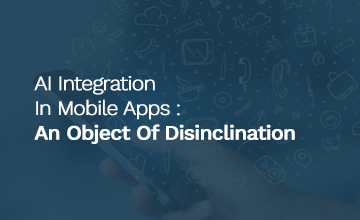
Commerce and science, despite being as distinct as they are, are often intertwined in a manner that boosts their mutual growth.
Businesses and technology share such a relationship. Companies that do not use technology to grow, and leverage the scientific advantage that they might have for the customers stand a very potent chance of losing their place in the market.
A number of businesses have failed because they were unable to embrace the advancements in technology and innovate their services to enhance the customer experience. Technology holds the power and the capability to change even the foundational functions of a company.
One of the biggest technological influences in recent years has been the development of artificial intelligence. The power and impact of artificial intelligence is such that it transforms the way in which businesses interact with customers, business decisions are made, and workflow procedures.
The modern aviation industry is focused on providing a perpetually positive experience for all customers.
This had led to an unrestrained integration of technology into the various aspects of air travel — such as, buying tickets through a mobile application, self-check-in kiosks at airports, being able to check-in through the mobile application, and booking special in-flight meals.
The implementation of artificial intelligence in the aviation industry is still in its nascent stages, therefore the level of transformation that would cause still remains to be explored. There are multiple areas in the industry that would alter increasingly with technology.
Crew Management
A major factor that contributes to making an aviation brand customer-friendly is the crew that interacts with the customers first-hand. A job in the aviation industry is supremely taxing, and an individual would wear out faster than a stationary sea-level job.
Therefore, it is necessary that the rosters prepared for the aviation crew be thought out by keeping in mind the work experience, credibility, certifications, and qualifications of each member of the crew.
Artificial intelligence would be extremely helpful in rostering staff to form combinations that would guarantee the best possible service to customers. This would include flight attendants, pilots, ground staff, engineers, and other members of a usual crew.
Flight Maintenance
Maintenance is a substantial cost in the aviation industry, and when done incorrectly it can cause safety and security concerns over and above disturbing the budget. Aircraft maintenance schedules have an influence on the number of flights the carrier can undertake on that particular day, and staff roster over multiple other things.
Therefore, it is important that maintenance schedules be impeccably planned to avoid unplanned expenditures, flight delays, and rostering confusions. Artificial intelligence can play an important role in smoothening out the processes.
Maintenance engineers can employ artificial intelligence to predict potential failures before they actually become evident.
Preventive maintenance practices can help airlines reduce the number of flight delays, flight cancellations, and route changes; apart from ensuring a more secure and safe journey.
Artificial intelligence can also be employed to inform employees — ground staff and in-flight crew — about problem areas that require immediate attention in case sudden technical issues arise.
Ticketing systems
There are a number of factors that influence the price of air tickets — these would include aspects such as fuel prices, distance and route of flight, the time between purchase date and travel date, competition in that sector, seasonality, and the brand value of the airline, and more.
Some of these factors are further dependent on other forces, and hence change frequently — such as fuel prices.
This makes the price of air tickets dynamic in nature. Artificial intelligence-powered ticketing systems would help the airline to calculate the most cost-effective ticket prices, thus increasing the airline’s chances of maintaining consistent profitability.
Passenger Service
Artificial intelligence would also be able to ease the process of passenger check-in and baggage drop procedures. Technology would allow airlines to build self-service bag drop machines and kiosks for passenger identification.
These kiosks would have a camera that can take a photograph of the passenger while they check-in, match it to their documented proof of identification, issue boarding passes automatically, and tag luggage accordingly.
This would help the airline cut costs, speed up the process, and reduce human errors. The passenger service could also include a facility that would undertake a host of assistance before the passenger reaches the airport.
These might include booking a cab to the airport, checking flight status at regular intervals, saving a parking spot at the airport, and placing an order from the lounge menu.
Also Read :
Simplify Communication
Air Traffic Control (ATC) is an important component of all flights. Seamless communication with the ATC is important for the safety of every flight. However, communication between pilots and ATC can become difficult because of tangible factors — such as a noisy ATC, thick accents on either side of the line, or other technical faults. Artificial intelligence can fill this gap effectively.
By studying the information about flights that would be in that area, artificial intelligence can become an effective backup information source that pilots can rely on in absence of an effective channel with the ATC.
Further, artificial intelligence can act as a translator to bridge communication gaps and; also maintain a digital transcript of any exchange to help in quality improvement.
Conclusion
Artificial intelligence will become the underlying truth of every technological interaction that humans would have during the course of an ordinary day, and the aviation industry cannot remain unaffected by the advancements being made in this area.
The principal focus of introducing artificial intelligence in the aviation industry is to increase the extent of automation, iron out bottlenecks in modern airports due to human intervention, and improve the service quality given to the customers.
However, the aviation industry is yet to realize the full potential of artificial intelligence, and experts would have to continue to work towards integrating technology in higher concentrates than today.
Artificial intelligence remains a potent answer to the questions regarding security, safety, and rising budgets in the industry. It would be extremely fascinating to witness how the aviation industry transforms from here on.
About Fusion Informatics
While airplanes are the physical manifestation of scientific marvel and human imagination, the things that artificial intelligence can accomplish are also a testament to the human ability to create things out of thin air.
The maze of technology is often out of bounds of the larger populace and thus leads to inconsistent understanding. We, at Fusion Informatics, are determined to bring you technology that is potent yet accessible. Our teams are focused on helping clients realize how the marriage of technology and commerce does not have to be complicated.






